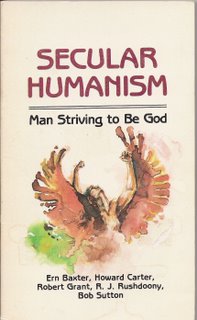
Ern Baxter in "Secular Humanism - Man Striving to Be God".
This is going to be a half book-review, half re-print of some more of Ern Baxter's writing. I found this book quite by accident by doing a search on Amazon. It was originally published by New Wine and Integrity Publications (of which Ern was a director) and it is essentially a compilation of various authors including R J Rushdoony and Howard Carter and of course Ern himself.
Like much of Ern's ministry, the book is still prophetic today in many aspects. The book defines humanism as: "The attempt by man to rule his own destiny totally apart from the sovereignity of God". It's warning is obviously that the church must beware lest humanism creep into our ranks. I am worried it is already here and in, so the book deserves even more readability.
R J Rushdoony opens the book by talking about humanism as 'the world's second oldest religion'. He then goes on to detail principles of humanism; first the issue of lordship. "Man is the lord, his own god". Secondly humanism sees man as the property of man. Thirdly the source of law in any philosophy or religion is the god of that system. Therefore if the Lord God of Scripture is our God, then biblical law is our law. Fourthly humanism stresses man's experience, reason, authority or will - not the Lord and His Word. Fifth humanism believes in self-justification. Sixthly in humanism man seeks to make the world in terms of his own word.
So to Ern Baxter. Rather unsurprisingly he takes an optimistic, victorious view of the situation rather than getting down about it and writes on the "Ultimacy of God's Government". His chapter is, in essence, an unpacking of Psalm 2. He begins by asking; "Why is the world in turmoil and so full of unrest?". Or more biblically accurate; "Why are the nations in uproar and the people devising a vain thing?". The answer? Humanism.
He said; "It is fallicious to consider the struggle between scheming humanists and God the Supreme as a conquest between equals, the outcome of which is in question. Many Christians who should know better are paralysed by the fear of humanist conquest and divine defeat and so succumb to passive despiar. The psalmist invites us to look up and see the one 'that sitteth in the heavens'.
The enthroned Jehovah was the source of the psalmists hope. The ultimacy of God's victory and government is assured!
God surveys men's petty plottings with sovereign contempt. He laughs at the pompous petulance and childish conduct of creatures challenging their Creator.
Ern Baxter Defines "Mount Zion".
It is significant that God specifies exactly where He has installed His King. It is upon 'Zion, My holy mount'.
Zion is a special place with distinctive associations. It was that part of Jerusalem which was considered impregnable and was held by the Jebusites. God's Presence, God's King, God's covenantal people were all concentrated on Mount Zion. Zion was more than a geographical locality.
It was a combination of divinely designed ingrediants which made it not only the city of David, but the "city of God". It also pointed to a larger, new-covenant city whose inhabitants would be 'from every nation and all tribes and peoples and tongues".
The decree determines that the Sovereign Son shall have universal dominion. Since 'the earth is the Lord's and all it contains, the world and those who dwell therein' and inheritance is the natural right of sonship, then all that belongs to Jehovah is the inheritance of His Son-King".
In Conclusion ...
The book is relatively short (about 90 pages) but the content in it is just outstanding. It is worth reading for Baxters and Rushdoony's chapters alone. The authors are not blindly victorious in terms of ignoring the fact that evil will indeed increase as per the promises of Christ in Matthew, but they also fervently believe that God's promises are that His Kingdom SHALL reign where'er the sun doth it's successive journeys run.

No comments:
Post a Comment